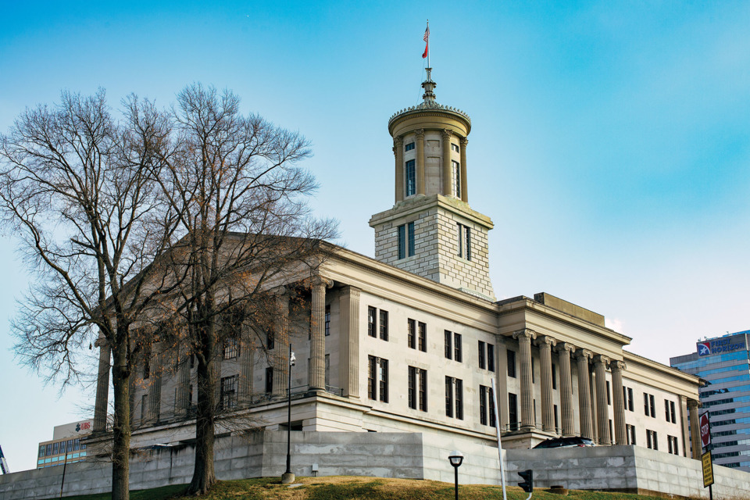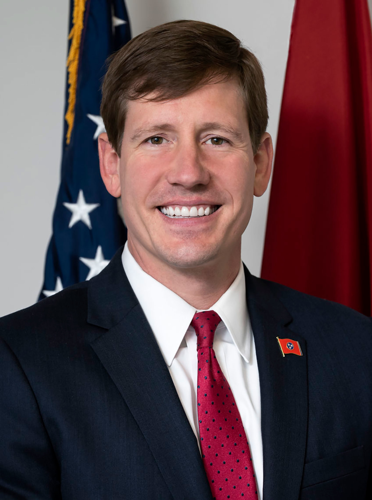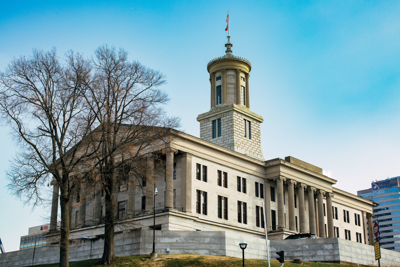
Sen. Brian Kelsey
On May 5, state Sen. Brian Kelsey (R-Germantown) stood before his colleagues with a serious message: Democracy is under attack in Tennessee. The culprit? A particular way of seeing history. “Critical race theory teaches American democracy is a lie,” he said. “It is harmful to our democracy, it is harmful to our citizens, and it is harmful to our students.” Tennessee should ban critical race theory in schools, Kelsey urged.
Kelsey introduced new language to a piece of legislation that named a broad list of off-limits topics for teachers: Teachers must stick to state standards, facts and “impartial” discussion (though it is unclear who defines “impartial” in this context). The problem is, that makes it difficult to teach important topics like slavery, internment camps, redlining, the Three-Fifths Compromise or the Trail of Tears. But according to the legislation, schools will lose funding for discussing material that suggests “an individual, by virtue of the individual’s race or sex, is inherently privileged, racist, sexist, or oppressive, whether consciously or subconsciously,” “a meritocracy is inherently racist or sexist, or designed by a particular race or sex to oppress members of another race or sex” and other ideas. By outlawing some discussions of historical inequality, these new restrictions make it significantly more difficult to teach history courses.
On May 5, the bill including Kelsey’s language was passed by the Tennessee legislature. On May 7, Kelsey tweeted: “Tennesseans asked us to ban Critical Race Theory in our public schools, and we answered.” But the actual amendment makes no mention of the theory, and Kelsey’s characterization of CRT is misleading at best.
“Critical race theory is a theoretical framework that emerged from critical legal studies to analyze the ways in which race and racism intersects with laws,” says Rich Milner, the Cornelius Vanderbilt Chair of Education in the Department of Teaching and Learning at Vanderbilt Peabody College.
CRT does not teach that “democracy is a lie,” as Kelsey suggests, but instead attempts to make democracy work for everyone. “The framework is designed to expose racist policies and practices that harm people of color,” Milner explains. “For instance, as is evident in case after case, people of color receive harsher punishments for the exact same infractions. The framework exposes these patterns of discrimination and works to stop these practices.”
Kelsey & Co.’s ban made it to the state legislature through somewhat complicated means. It began with an uncontroversial bill meant to clean up language around licensure, waivers and other clerical processes. In the House, sponsor Rep. John Ragan (R-Oak Ridge) amended the bill to include language about race, with further input from Kelsey. While the amendment addressed Kelsey’s claims, critical race theory is not mentioned by name.
By the time the bill reached the House floor, Ragan was caught in a long line of questioning about the amendment’s opaque language and purpose. Rep. Hardaway (D-Memphis) asked about the intent of the additions.
“Does your legislation speak to critical race theory?” Hardaway asked.
“Critical race theory is not mentioned anywhere in this legislation,” Ragan replied.
“Did critical race theory play a part in the genesis of this legislation?” Hardaway asked.
“I’m not sure I understand your question,” Ragan said, “since no one has defined critical race theory for me.”
On May 7, Kelsey appeared on Memphis’ WREG defending his focus on the ideology, despite the fact that the bill’s lead sponsor, Ragan, would not say that it was in the bill at all. “It’s a Marxist theory that’s totally against everything we stand for,” Kelsey said. He also claimed that CRT proponents believe that Martin Luther King’s dream was “impossible” and “a lie.”
But here Kelsey demonstrates a clear misunderstanding: Critical race theory does not claim that some people are better or worse — it highlights unequal treatment under current laws. Critical race theory doesn’t challenge specific institutions unless those institutions perpetuate inequality.
Why do lawmakers suddenly want to ban CRT? Milner suggests it makes them uncomfortable. “They fear it because it could disrupt their own privileges,” he says.
HB0580 is not an isolated phenomenon: Several other states recently banned CRT from their own curricula. Over the past year, Fox News broadcasts mentioned critical race theory more than 150 times. Yet there is no evidence that CRT is taught in Tennessee schools at all. “The biggest misconception is that CRT is taught in P-12 schools,” says Milner. “I cannot name one public school across the nation teaching CRT — not one. Sadly, they are banning CRT and have no idea what it is. It’s a theory — an analytic tool, not a teaching approach or curriculum in P-12 schools.”
While debating the new bill, Ragan championed what he called a “facts-only” approach, while many others stressed the importance of addressing historical injustices in classroom discussion. “We cannot create a more perfect union without recognizing, acknowledging and confronting the imperfections,” Hardaway said.
There were moments on May 4 when the House floor sounded like the best parts of history class: There was respectful debate, a passion for history and a commitment to reaching mutual understanding about justice and democracy — not characteristics that can always be found in the frequently contentious chamber. (Not that the debate was free from embarrassing moments, however. At one point during the bill’s discussion, Knoxville Republican Rep. Justin Lafferty contended that the inherently racist Three-Fifths Compromise, which prescribed counting enslaved people as less than a person for apportionment purposes, was actually a good thing.) Many legislators mentioned their respect for their colleagues, or hopes to bridge the divide between the Republican supermajority and the significantly smaller Democratic caucus.
But ultimately, HB0580 passed 69-20. This week, Gov. Bill Lee — having already expressed support for some of the Republican arguments in favor of the bill — signed it into law. Now, the sort of debate seen on the House floor will not be allowed in Tennessee classrooms.







